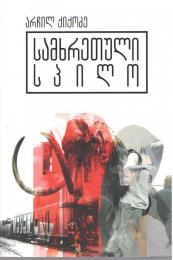SOUTHERN ELEPHANT
KIKODZE ARCHIL
Elephantis an urban novel whose action takes place in a single day. A film director who has stopped shooting films lets a friend have his apartment to meet a girlfriend, while he himself passes the time wandering the Tbilisi streets. This is a day for looking in the mirror of the past and reappraising his own life, a day in which his childhood, his love, passion, mishaps and tragedies flash past like frames from a film. Against the background of the main hero’s memories recent Georgian history is replayed: it constantly pursues the narrator like a shadow and makes him accept responsibility for what is happening around him. The novel has one other important character, Tbilisi, with its complex relationships, its social obligations, sometimes heavy, sometimes light, sometimes happy and sometimes tragic, but more often than not grotesque. The narrator knows his city only too well, it has brought him a great deal of pain. The narrator’s memories, however, several times go beyond the boundaries of the capital into Mingrelia, Svanetia, or European cities. The novel has one other theme: cinematography. This is a book about two young men who dreamed of becoming film directors and making films in a destroyed country, where cinematography had ceased to exist. One of them (the more talented Tazo) has never managed to fulfil his dream. The other (the narrator) has in fact become a director and made one successful film, but a tragic event happened when shooting the second film and made him permanently hate his art, so that now he films advertisements. Newly established Georgian businessmen, who are the narrator’s customers and whose wealth can be traced back to the blood-soaked 1990s, are yet another thread in the novel. This is a novel about moral dilemmas, about how to stay human. Thanks to the narrator’s memories a story takes shape of how Tazo was made to deliberately isolate himself. Years earlier stood aside from a conflict between little boys which resulted in the death of one of them. Feelings of remorse have taken away all his vital energy and turned a young lad into an old man. The aggression and ‘bullying’ of young people, the path which two friends took at an early age, is another theme of the novel. The narrator walks the city, which he knows like the back of his hand. The book is geographically very exact. The narrator lives at number 11 Kiacheli Street, next to the house where Lavrenti Beria used to live. This ‘neighbourhood’ takes the narrator to the period of Georgian history when he had only just been born – the roots of violence and aggression, the Soviet heritage, whose evaluation and analysis society has not yet got round to. The infantilism of this society, thanks to which it has to be punished one day! That is something the narrator is convinced of. The novel has a dramatic love story running through it. At one point the narrator lacked the courage to change his way of life and keep hold of a person whom he loved. He failed to understand that this was not just another adventure – ‘Sometimes we spend a whole life learning how to let go. Sometimes letting go becomes a habit and then we let go of the most important thing, unable to grasp that it was the most important…’
‘Southern Elephant is probably by now the latest thing in recent Georgian literature, it manages to capture the invisible spirit of the times, the Zeitgeist. The novel’s reader can expect a novel à clé which blends nostalgia and melancholy and (to quote Roland Barthes) pleasure derived from a text.’
Zaal Andronikashvili, literary critic
‘Southern Elephant is a novel which the city has long been waiting for. Just as Marcel Proust was earned by the Champs Elysée, so Tbilisi has earned Archil Kikodze, who has in his very first novel put the capital city in its pocket.’
Levan Berdzenishvili, writer, critic
Extract will be available soon
In case of using the information, please, indicate the source.
In case of using the information, please, indicate the source.
